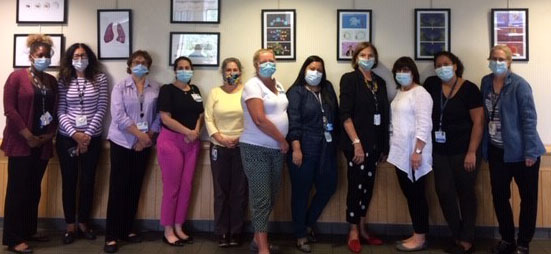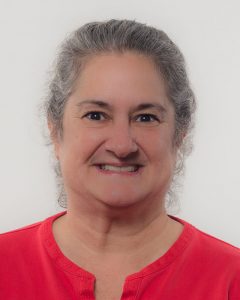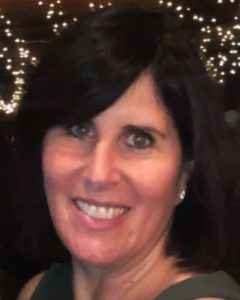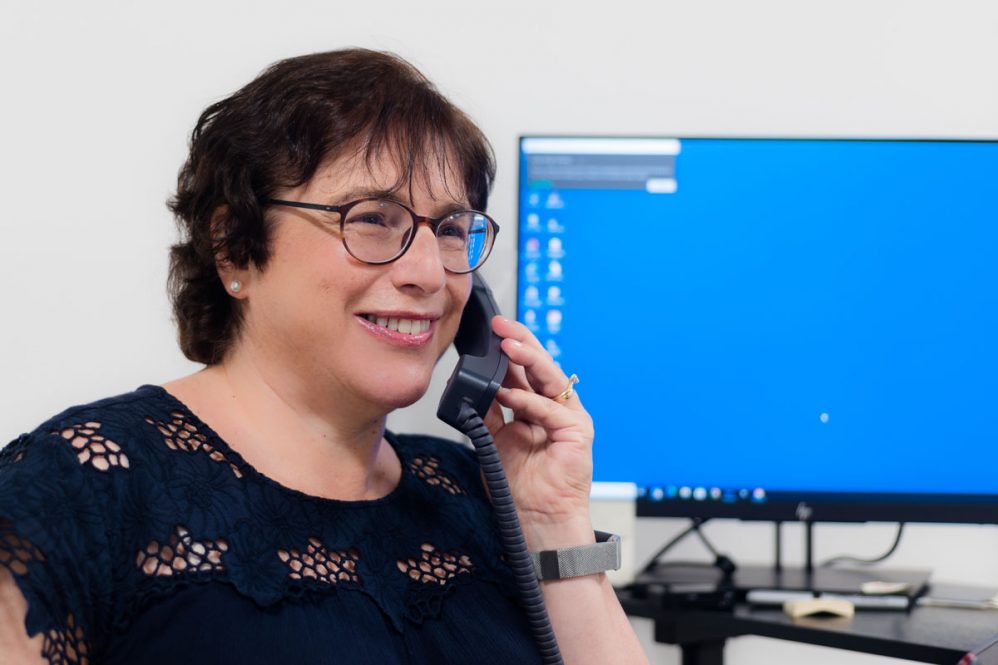Licensed clinical social workers are important contributors to patient care. At UConn Health, they’re available in both inpatient and outpatient settings, offering patients support and connections to resources.
Within the UConn Health Care Coordination Department, there are 14 licensed clinical social workers under the leadership of clinical social work supervisor Deb Feigenbaum.

“We understand that people in the face of a medical challenge sometimes can cope very capably, but there are other times when having a medical need or an acute illness can trip people up in their otherwise good, regular functioning,” Feigenbaum says. “And we as clinical social workers are in a position to provide interventions that will hopefully be restorative, hopefully be supportive, and hopefully help them to cope with whatever current challenges they’re facing.”
Each licensed clinical social worker is dedicated to at least one area of practice within UConn Health, largely, though not entirely, inpatient.
“We all remain really cognizant of the fact that we practice within a host environment,” Feigenbaum says. “We have patients, we care for families, but we also care for our fellow interdisciplinary team members. We care for the larger community in which we practice.”
Here, three Care Coordination Department social workers elaborate on their roles and share their perspectives.
Describe what your day is like:
Wendy Knebel (inpatient psychiatry): I am a social worker/discharge planner/case manager/utilization reviewer. I am involved from the moment of admission working on a team with the geriatric attending psychiatrist, psychiatric residents, medical students, nursing students, and social work interns. I am involved from the moment of admission, participating in family meetings, discharge planning, legal issues including filing for commitment, conservatorship, medications against will, and electroconvulsive therapy against will plus commitment to substance abuse. I set up outpatient appointments, get patients to inpatient rehabs (physical rehab and/or substance abuse rehab). I sometimes find housing but only in group homes or residential care homes and/or at assisted living facilities, and nursing homes for long-term care. I advocate for the patient both inside and outside of the hospital.

Patricia Newman (intensive care unit): My primary role is to provide support and education to patients and families as well as to the staff. Sometimes the ICU medical team will seek me out for a specific reason such as when a patient is critically ill and they urgently need to find a medical decision maker. That’s when I put on my detective hat and search for a relative while the ICU medical team provides the best medical care to the patient. Other times the bedside nurse, who spends the most time with the patient and/or family, will call me to provide education or support.
Sue Eisenberg (internal medicine, geriatrics, and other specialty clinics): My referrals come from physicians and nurses, patients, and family members. Some of their issues are concrete, such as food, housing and transportation. Other needs are more complicated, including mental health treatment, substance use, domestic violence and long-term planning for future needs. I work with patients and families in educating them about resources, and helping to connect them with such resources, always bearing in mind that if their needs are met in the community, unnecessary hospitalizations are prevented.
What do you see as social work’s greatest contributions to patient care?
Eisenberg: Social workers advocate for patients and families both in the hospital and in the community. We are trained to look at the whole person in addition to their medical needs.
Knebel: We set up the next level of care, which is crucial to the patient’s health and staying out of the hospital or needing acute care. We advocate for the patient when he or she cannot advocate for himself or herself.
Newman: I believe that social work’s greatest contribution to patient care is advocacy. We have the privilege of advocating for the goals of care chosen by the patient and/or family. We are often the mediator between the medical team and the patient/family. Social workers are trained to see the big picture and to help both sides understand the circumstances. This is especially important in the ICU with critically ill patients and frequent end-of-life discussions.
Feigenbaum: I think because we look at people in a multifaceted way, we’re able to help promote a deeper, fuller understanding of our patients for the medical team. But we’re also in a position to give a voice to the patients and their families when they may be in a crisis, or they may be overwhelmed, or they may be challenged by decision-making or treatment options or planning. We’re in a really good position to help navigate all of those different needs for patients and families and medical team members.
How has the pandemic affected your work? Your patients?
Newman: Part of the ICU was biocontained, and the part included my office. Therefore I was moved to a floor without COVID patients. My assignment still included ICU however I was not able to meet with the sickest patients, and those were the COVID patients. Ultimately, I gowned and gloved like every other provider and met with the patients who needed me the most, whether or not they had COVID. The pandemic forced me to acknowledge that my work and my role was as important as every other member of the team, and in that regard, I needed to step up and did not need to be “protected” from COVID.
Eisenberg: The pandemic has been challenging for all. As an outpatient social worker, I have had less face-to-face interaction with patients and families; I miss seeing their faces! I have needed to learn to work virtually. Thankfully, this is starting to change. I have seen an increase in mental health needs, as our patients and families have been more isolated.
Knebel: The pandemic has affected psychiatry in that the patients have been more depressed throughout, understandably. Therefore, we have had more depressed patients on the unit. But I still came to work every day throughout. Like everyone working in a hospital, I was very nervous at first. Then, as I saw my co-workers and patients become COVID-positive and heal from it, I felt much safer.
What is something about social work that more people should know?
Knebel: We care!
Newman: More people should know that social workers in the hospital setting are essential members of the team. We are “big picture” people, we can bridge the chasm of medical jargon for patients and families, we can advocate in a non-judgmental way, and we can provide resources and support beyond what any other member of the team can provide.
Eisenberg: We all have our master’s degree in social work, and are licensed clinical social workers through the state of Connecticut. It’s a strength, rather than a weakness, to ask for help when you need it. Social workers are non-judgmental and are safe to talk to.

Feigenbaum: As licensed clinical social workers, we always include the influence of both social and psychological factors, so that to any situation we bring this both broad and integrated perspective of evaluation and understanding. We call our tool a psychosocial assessment. It’s a thorough and comprehensive assessment that evaluates needs and risks, but we put it all into that bigger combination of psychological and social factors. It’s really complex. My team is so skilled that they make it look easy. It’s presented in an integrated manner, but the work they do is very multifaceted and really complicated, and they do it super well.
What drew you to this profession?
Eisenberg: Honestly, I felt like it was my calling. I’ve always wanted to dedicate myself to helping others. Maybe it runs in the genes? My mother was a social worker, and our daughters are in the helping professions too.
Knebel: I became a social worker to help people.
Newman: I was drawn to social work because it is a helping profession. Since I was a kid, I dreamed of helping people, however social work was not in my plan. I attended graduate school in my late 30s and knew that I had found my calling. Social work in a hospital setting is where I am meant to be, I know this without doubt.
What do you like best about practicing social work at UConn Health?
Newman: This job is manageable for me because of the amazing supervisor and coworkers with whom I have the privilege of working. There is significant stress and sadness working in the ICU, especially during a pandemic. It has been life (and sanity) saving to have Deb Feigenbaum and this outstanding group of social workers to help support each other every day.
Eisenberg: It’s an honor to work with UConn Health patients and families who have entrusted me with their most personal issues and concerns. I have incredible co-workers who are always there to support and learn from each other.
Knebel: I love my co-workers and feel so lucky to have met them and to be working with them. It is a meaningful experience to work with those you love.
Feigenbaum: I feel profoundly privileged to supervise this group of capable clinicians. They are smart, they do incredible complex work in a host environment effectively and with grace. It’s an incredible team. The collective wisdom and experience of this team is profound. I’m overwhelmingly proud of the people I work with.



